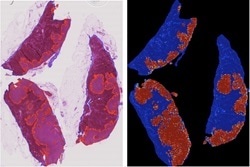Feb 16 2017
Proscia Inc., a data solutions provider for digital pathology, and Samsung Medical Center, South Korea’s preeminent clinical and biomedical research institute, today announced a partnership focused on developing tools that enable predictive medicine in the fight against cancer. The goal of the collaboration is to leverage mathematical oncology and novel deep-learning approaches to provide predictive insight into the likelihood of lung cancer lymph node metastasis, improving physicians’ ability to prescribe targeted cancer therapies.

Proscia's technology enables identification and quantification of cancer "hot-spots" on tissue biopsies
Advances in digital pathology have enabled the extraction of clinically relevant quantitative histological information from cancer tissue. In early results, Proscia has demonstrated the ability to use this quantitative histology to determine the likelihood of lymph node metastasis in breast cancer. In the first phase of its collaboration with Samsung Medical Center, Proscia will develop an automated algorithm for metastasis prediction from primary lung tumors. Over time, the two organizations will leverage Samsung Medical Center’s clinical expertise to expand metastasis prediction to multiple tumor types.
“There is currently no accurate method, neither from radiology nor molecular biomarkers, to predict lymph node metastasis,” said Dr. Insuk Sohn, Chief Senior Researcher at Samsung Medical Center. “Accurate prediction of lymph node metastasis is critical in selecting optimal patients for endoscopic resection. The collaboration between our specialists and those at Proscia will make major improvements in the clinical decision process and ultimately save patients’ lives.”
“As cancer treatment shifts towards new therapies and procedures and are less invasive and more precise, the importance of having a clear understanding of each patient’s individual cancer has increased as well,” said Hunter Jackson, Chief Scientific Officer at Proscia Inc. “This partnership leverages the combined power of quantitative histology and machine learning to generate insights that can give a more complete picture of a patient’s cancer.”
While the initial target of this partnership is the prediction of lymph node metastasis in lung cancer, validation of this initial product will open the door to similar endeavors in other cancers. “Once the pipeline is setup, there are many applications in different tumor types such as hepatocellular carcinoma and gynecological cancers,” said Dr. Chang Ohk Sung, Assistant Professor in the Department of Pathology at the Asan Medical Center and a member of the collaboration team.
Proscia has amassed experience in the development and deployment of tools that drive insight about cancer. The results from Proscia’s active collaborations with research departments at several major academic medical centers across the United States have had major clinical implications and pushed the boundaries of the understanding of cancer. These successes were made possible by the execution of a seed round of funding raised last year. Proscia expects to raise another round in early 2017 based on this validation. The company recently launched image analysis applications on its platform that enable pathologists and researchers to extract meaningful information from whole slide images and power their own studies. Its partnership with the Samsung Medical Center advances Proscia's vision of improving clinical outcomes and accelerating the discovery of breakthrough advancements in the fight against cancer.